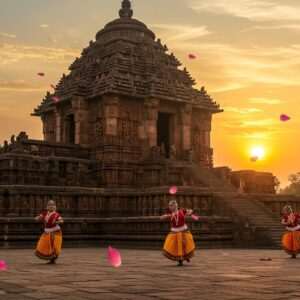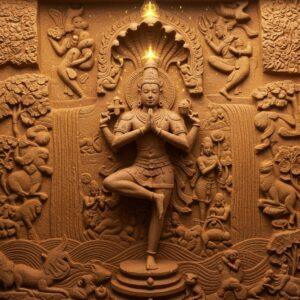
Exploring the historic city of Goindwal Sahib offers a glimpse into the profound impact of Sikhism on Indian culture. Founded in 1552 by the third Sikh Guru, Guru Amar Das Ji, under the guidance of Guru Angad Dev Ji, this city holds immense spiritual and historical importance for Sikhs worldwide. Nestled on the banks of the Beas River in Punjab’s Tarn Taran district, it beckons those seeking spiritual solace and a deeper understanding of Sikh heritage. Let’s delve into the essence of this sacred place.
The Life and Legacy of Guru Amar Das Ji
Guru Amar Das Ji’s life was a testament to spiritual devotion. Even before becoming the third Sikh Guru, his heart yearned for enlightenment. His leadership enriched Sikhism with invaluable contributions, including championing gender equality, opposing caste discrimination, and establishing practices that continue to guide the Sikh community. His wisdom and compassion touched countless lives, leaving an enduring mark on Sikh history.
The Genesis of Goindwal Sahib
Goindwal Sahib’s story begins with a trader named Goinda, who dreamt of founding a village. Seeking guidance from Guru Angad Dev Ji, he received blessings and direction, leading to the establishment of Goindwal in 1552. It quickly evolved into a vibrant Sikh hub under Guru Amar Das Ji’s leadership, who resided there for 33 years, nurturing the community and spreading Sikh teachings. The city’s location on the Beas River further enhanced its importance as a center for trade and pilgrimage.
A remarkable architectural feat of Goindwal Sahib is the Baoli Sahib, a stepwell with 84 steps descending to the water. More than just a structure, it embodies deep spiritual symbolism. It is believed that immersing oneself in the Baoli’s waters and reciting the Japji Sahib with a pure heart paves the path towards Moksha, liberation from the cycle of rebirth. This belief underscores the profound spiritual significance woven into the fabric of Goindwal Sahib.
Goindwal Sahib’s Place in Sikh History
Goindwal Sahib holds a special place in the hearts of Sikhs as a revered pilgrimage site. The Baoli Sahib stands as a focal point for spiritual cleansing and devotion. During Guru Amar Das Ji’s time, Goindwal flourished as a center for Sikh teachings and gatherings, nurturing the faith and fostering a sense of community.
Several pivotal events in Sikh history unfolded in Goindwal Sahib. It was here that Guru Amar Das Ji first encountered Guru Ram Das Ji, the future fourth Sikh Guru. The city is also the birthplace of Guru Arjan Dev Ji, further enhancing its spiritual lineage. The revered Sikh scholar, Bhai Gurdas Ji, also chose this sacred city as his final resting place.
A Legacy of Social Reform and Equality
Goindwal Sahib’s influence extends beyond the spiritual realm into the social and cultural fabric of Sikhism. Guru Amar Das Ji initiated significant social reforms in Goindwal, advocating for widow remarriage and challenging the practice of Sati. He also established the tradition of langar, the community kitchen, where people from all walks of life share a meal together, embodying the principle of equality.
A notable event highlighting Goindwal Sahib’s significance was the visit of Emperor Akbar. His participation in the langar served as a powerful testament to the Sikh principle of equality. Under Guru Amar Das Ji’s guidance, Goindwal also played a crucial role in the development of the Gurmukhi script, vital for preserving Sikh scriptures and teachings.
Goindwal Sahib Today: A Vibrant Tapestry of Tradition
Goindwal Sahib continues to thrive as a significant spiritual and tourist destination. Ongoing efforts focus on preserving its historical and architectural treasures, ensuring its rich legacy endures. Annual religious festivals and events draw devotees from across the globe, creating a vibrant atmosphere of cultural exchange and contributing to the local economy.
A visit to Goindwal Sahib offers a unique opportunity to immerse oneself in its profound spirituality and historical richness. The city stands as a living testament to the enduring values championed by Guru Amar Das Ji. Whether you seek pilgrimage or historical exploration, Goindwal Sahib welcomes you with open arms to experience its timeless spirit.
How Poojn.in Can Enrich Your Spiritual Journey
At Poojn.in, we recognize the spiritual significance of Goindwal Sahib and offer a curated selection of items for devotees. Whether you’re planning a visit or wish to maintain a connection with this holy city, our online store provides a convenient way to access authentic Sikh religious items:
- Authentic Sikh Religious Items: Find everything you need, from Gutka Sahib in multiple languages to Kadas (steel bangles), pure cotton rumallas for Guru Granth Sahib, and traditional head coverings. We understand the importance of these items in your spiritual practice.
- Prayer and Meditation Essentials: Enhance your spiritual practice with our selection of prayer mats, meditation cushions, prayer beads (mala), incense sticks, and holders. Create a serene atmosphere for prayer and reflection in your home.
- Sacred Literature: Deepen your understanding of Sikhism with our collection of books about Guru Amar Das Ji, historical texts about Goindwal Sahib, Sikh prayer books, and educational materials about Sikh traditions. Learn more about the rich history and philosophy of the Sikh faith.
To explore our collection and enhance your spiritual journey, visit www.poojn.in or connect with us via call at 03369029784 or WhatsApp at 9476142738. We offer pan-India delivery and dedicated customer service to assist you with your spiritual needs.
Note: Poojn.in is dedicated to supporting your spiritual path by providing authentic products with the convenience of online shopping.
Common Questions About Goindwal Sahib
Where did Guru Amar Das Ji reside? Guru Amar Das Ji made Goindwal Sahib, the city he founded, his home. It became a prominent spiritual center for Sikhs during his lifetime.
What is the significance of Goindwal Sahib? Goindwal Sahib holds immense significance as the first Sikh pilgrimage site, established by Guru Amar Das Ji. It is renowned for the Baoli Sahib, a sacred well with 84 steps.
How did Goindwal Sahib get its name? Goindwal Sahib derives its name from a local trader named Goinda, who assisted Guru Amar Das Ji in acquiring the land to establish the city. This act of service is remembered in the city’s name.
What is the Baoli Sahib? The Baoli Sahib is a sacred stepwell in Goindwal Sahib, constructed by Guru Amar Das Ji. Pilgrims visit the Baoli to perform spiritual cleansing and recite prayers on each of its 84 steps, seeking blessings and purification.
Why did Guru Amar Das Ji choose Goindwal Sahib as the location for the city? Guru Amar Das Ji chose Goindwal Sahib due to its strategic location along a trade route, which facilitated the dissemination of Sikh teachings and provided a central gathering place for followers. This strategic choice helped spread the message of Sikhism far and wide.
What are the key features of Goindwal Sahib? The key features of Goindwal Sahib include the Baoli Sahib, the Gurudwara Shri Goindwal Sahib, and the serene atmosphere, which attracts pilgrims and tourists seeking spiritual solace and historical insights.
Did Guru Amar Das Ji live anywhere else besides Goindwal Sahib? While Guru Amar Das Ji dedicated much of his time to Goindwal Sahib, he also traveled extensively to share the teachings of Sikhism. However, Goindwal Sahib remained his primary residence and spiritual center.
Conclusion: The Enduring Spirit of Goindwal Sahib
Goindwal Sahib is more than just a city; it’s a living embodiment of Sikh spirituality, history, and culture. Guru Amar Das Ji’s vision transformed this town into a dynamic center for Sikh teachings and social reform. The Baoli Sahib, with its 84 steps, continues to symbolize spiritual enlightenment and liberation. Goindwal Sahib’s rich legacy continues to inspire devotion and unity amongst Sikhs worldwide. Visiting this sacred city allows you to connect with the timeless values established by Guru Amar Das Ji, leaving you with a sense of peace and inspiration.


